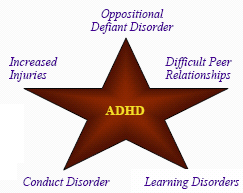Attention-Deficit/Hyperactivity Disorder
(ADHD) often occurs with Oppositionalother disorders, referred to as
comorbidities of ADHD. The combination of Defiant Disorder ADHD and its
comorbidities presents extra challenges to affected individuals, educators,
and health care providers. Diagnosis and treatment are more difficult when
ADHD and another condition are present in the same individual.
 About
half of children with ADHD referred to clinics have behavior disorders as
well as ADHD. Oppositional Defiant Disorder is one of the most common
disorders occurring with ADHD. Conduct Disorder is less common, can be
significantly disruptive, and is difficult to treat. Increased injuries and
strained peer relationships are also common in this population. Because
significant challenges may result from having ADHD and another disorder, it
is important to screen every child with ADHD for other disorders and
problems.
About
half of children with ADHD referred to clinics have behavior disorders as
well as ADHD. Oppositional Defiant Disorder is one of the most common
disorders occurring with ADHD. Conduct Disorder is less common, can be
significantly disruptive, and is difficult to treat. Increased injuries and
strained peer relationships are also common in this population. Because
significant challenges may result from having ADHD and another disorder, it
is important to screen every child with ADHD for other disorders and
problems.
Recently released data from the 1997-98
National Health Interview Survey suggests roughly half of those youth 6-11
years old diagnosed with ADHD may also have a Learning Disorder (LD). The
combination of attention problems caused by ADHD and LD can make it
particularly hard for a child to succeed in school. Properly diagnosing
each disorder is crucial. Appropriate and timely interventions to address
ADHD and LD should follow diagnosis. The nature and course of treatment for
ADHD and LD may be different, and different types of providers may be
involved. Working with health care professionals to determine appropriate
referrals and treatment is the best way to make informed decisions for an
individual dealing with ADHD and a learning problem.
What are some of
the symptoms of common ADHD comorbidities?
Oppositional Defiant Disorder (ODD)
Only a qualified mental health professional can diagnose ODD. ODD usually
starts before age eight, but no later than early adolescence. Symptoms may
occur most often with people the individual knows well, such as family
members or a regular care provider. These behaviors are present beyond what
are expected for the child’s age, and result in significant difficulties in
school, at home, and/or with peers. Examples of ODD behaviors include:
-
Losing one’s temper a lot
-
Arguing with adults or refusing to
comply with adults’ rules or requests
-
Often getting angry or being resentful
or vindictive
-
Deliberately annoying others; easily
becoming annoyed with others
-
Often blaming other people for one’s own
mistakes or misbehavior
Conduct Disorder (CD)
Conduct Disorder is a behavioral pattern characterized by aggression toward
others and serious violations of rules, laws, and social norms. These
behaviors often lead to delinquency or incarceration. The symptoms of CD
are apparent in several settings in the person’s life (e.g., at home, in
the community and at school). While CD is less common than Oppositional
Defiant Disorder, it is severe and highly disruptive to the person’s life
and to others in his/her life. It is also very challenging to treat. A
mental health professional should complete evaluations for CD where
warranted, and a plan for intervention should be implemented as early as
possible.
[ADHD References]
Please Note:
Documents bearing the
 logo are in the Portable Document Format (PDF) and require the Adobe
Acrobat Reader for proper viewing.
logo are in the Portable Document Format (PDF) and require the Adobe
Acrobat Reader for proper viewing.
Visit http://www.adobe.com/
to get a free copy of Adobe Reader.
[Return
to Top]